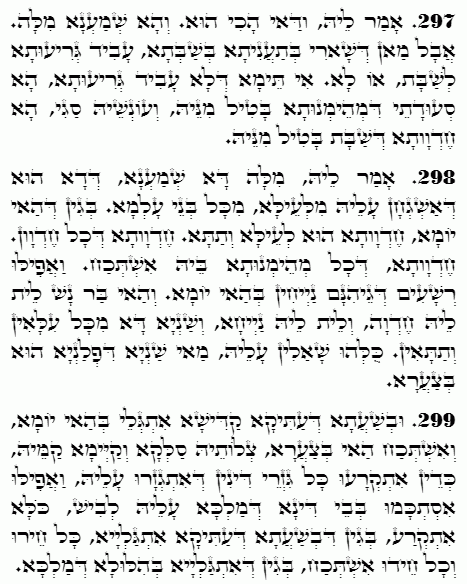Daily Zohar # 4571 – Emor – Fast again, if you fast on Shabbat
Daily Zohar 4571

Hebrew translation:
298. אָמַר לוֹ, דָּבָר זֶה שָׁמַעְתִּי, שֶׁזֶּהוּ שֶׁמַּשְׁגִּיחִים עָלָיו מִלְמַעְלָה מִכָּל בְּנֵי הָעוֹלָם, מִשּׁוּם שֶׁהַיּוֹם הַזֶּה הוּא שִׂמְחָה לְמַעְלָה וּלְמַטָּה, שִׂמְחַת כָּל הַשְּׂמָחוֹת, שִׂמְחָה שֶׁכָּל הָאֱמוּנָה נִמְצֵאת בָּהּ, וַאֲפִלּוּ הָרְשָׁעִים שֶׁל הַגֵּיהִנֹּם נָחִים בַּיּוֹם הַזֶּה. וְהָאִישׁ הַזֶּה אֵין לוֹ שִׂמְחָה וְאֵין לוֹ מְנוּחָה, וְזֶה שׁוֹנֶה מִכָּל הָעֶלְיוֹנִים וְהַתַּחְתּוֹנִים. כֻּלָּם שׁוֹאֲלִים עָלָיו: מַה שּׁוֹנֶה שֶׁפְּלוֹנִי הוּא בְּצַעַר?
299. וּבְשָׁעָה שֶׁהָעַתִּיק הַקָּדוֹשׁ מִתְגַּלֶּה בַּיּוֹם הַזֶּה וְזֶה נִמְצָא בְצַעַר, תְּפִלָּתוֹ עוֹלָה וְעוֹמֶדֶת לְפָנָיו, אָז נִקְרָעִים כָּל גִּזְרֵי הַדִּינִים שֶׁנִּגְזְרוּ עָלָיו, וַאֲפִלּוּ הִסְכִּימוּ בְּבֵית הַדִּין שֶׁל הַמֶּלֶךְ עָלָיו לְרַע – הַכֹּל נִקְרָע, מִשּׁוּם שֶׁבְּשָׁעָה שֶׁמִּתְגַּלֶּה הָעַתִּיק, נִמְצָאִים כָּל הַחֵרוּת וְכָל הַשִּׂמְחָה, מִשּׁוּם שֶׁמִּתְגַּלֶּה בְּהִלּוּלַת הַמֶּלֶךְ.
.
Zohar Emor
Continued from previous DZ
#297
He said to him, “Indeed, it is so as I have heard this matter. But does one who fasts on the Shabbat diminish the Shabbat, or not? If you say that he does not diminish it, then his fast nullified the meals of Shabbat for him, and his punishment is great because the joy of the Shabbat has been nullified for him.”
#298
He said to him, “I have heard that he is watched closely from above more than all the people of the world because that day is a joy above and below, a joy greater than all other joys, a joy in which all faith אמונה is found. Even the wicked in Gehennam rest on Shabbat, yet that person has no joy, no comfort, and is distinguished from all above and below; everyone asks about him, wondering why this person is in distress.”
#299
When Atika Kadisha (Keter) reveals Himself on Shabbat, and this person is distressed, his prayer ascends and stands before Him. Then, all the decrees of judgment against him are torn up. Even if the heavenly court agreed upon an adverse decree for him, everything is annulled. When Atika Kadisha is revealed, all freedom and all joy are present in the festive meal of the King, which is Zeir Anpin.
Lesson;
This Zohar discussion addresses the practice of fasting on Shabbat, which the Halacha laws discourage because Shabbat is meant to be a day of joy and rest, celebrated with festive meals. Fasting, typically a sign of mourning or repentance, contradicts the spirit of Shabbat. If one chooses to fast, thereby abstaining from these celebratory meals, it is viewed as diminishing the joy and sanctity of the day, resulting in spiritual consequences.
This reinforces the importance of honoring the Shabbat through joyous observance, including partaking in meals, which are seen as an expression of faith and a means to experience the Shabbat’s delight.
Even the souls undergoing purification in Gehennam (hell) are at rest. An individual’s fast on such a day marks him as an anomaly, drawing attention and concern from both above and below. The implication is that failing to partake in the joy of the Shabbat, which is the aspect of complete trust and peace in Hashem’s providence, separates an individual from the harmony of this sacred day.
Because ‘Atika Kadisha’ is revealed on Shabbat, it brings a time of freedom and mercy, and the usual constraints of judgments are relaxed; this is especially significant during the meal, which represents an opportunity for an intimate connection with Zeir Anpin. Thus, the Sabbath meal is not just a ritual observance but a profound spiritual practice that can lead to redemption and the annulment of harsh decrees, offering a unique moment of potential salvation and joy for all, including those who may be enduring hardships or judgments from above.
On Shabbat, it is forbidden to fast. The only fast that is permitted on Shabbat [apart from Yom Kippur if it falls on Shabbat] is a ‘ta’anit chalom’ (fast of a dream), which is undertaken when a person wakes up full of fear and for whom eating would be a form of affliction.
The Gemara states that fasting on Shabbat is a great virtue because if a person fasts while everyone else is enjoying themselves, it is more difficult, and therefore, the reward is greater.
If a person fasts on Shabbat [in a case where it is permitted], they must atone for the very act of fasting by observing an additional fast.
https://www.sefaria.org/Berakhot.31b.24?lang=bi&with=all&lang2=en
{||}

 Previous: Emor
Previous: Emor

